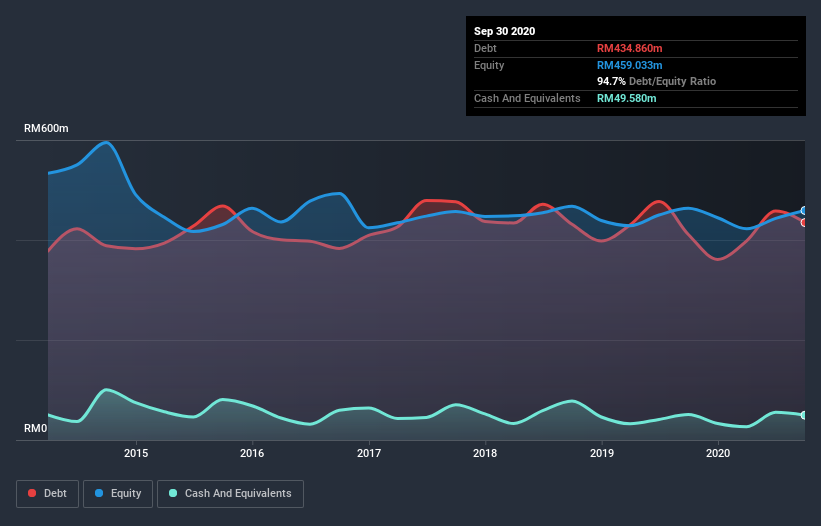- Malaysia
- /
- Commercial Services
- /
- KLSE:PBSB
Does Pelikan International Corporation Berhad (KLSE:PELIKAN) Have A Healthy Balance Sheet?

Some say volatility, rather than debt, is the best way to think about risk as an investor, but Warren Buffett famously said that 'Volatility is far from synonymous with risk.' So it seems the smart money knows that debt - which is usually involved in bankruptcies - is a very important factor, when you assess how risky a company is. As with many other companies Pelikan International Corporation Berhad (KLSE:PELIKAN) makes use of debt. But the real question is whether this debt is making the company risky.
When Is Debt Dangerous?
Generally speaking, debt only becomes a real problem when a company can't easily pay it off, either by raising capital or with its own cash flow. Ultimately, if the company can't fulfill its legal obligations to repay debt, shareholders could walk away with nothing. However, a more frequent (but still costly) occurrence is where a company must issue shares at bargain-basement prices, permanently diluting shareholders, just to shore up its balance sheet. Of course, the upside of debt is that it often represents cheap capital, especially when it replaces dilution in a company with the ability to reinvest at high rates of return. The first thing to do when considering how much debt a business uses is to look at its cash and debt together.
Check out our latest analysis for Pelikan International Corporation Berhad
What Is Pelikan International Corporation Berhad's Net Debt?
As you can see below, at the end of September 2020, Pelikan International Corporation Berhad had RM434.9m of debt, up from RM411.0m a year ago. Click the image for more detail. However, because it has a cash reserve of RM49.6m, its net debt is less, at about RM385.3m.

A Look At Pelikan International Corporation Berhad's Liabilities
The latest balance sheet data shows that Pelikan International Corporation Berhad had liabilities of RM530.2m due within a year, and liabilities of RM430.6m falling due after that. On the other hand, it had cash of RM49.6m and RM333.7m worth of receivables due within a year. So its liabilities total RM577.5m more than the combination of its cash and short-term receivables.
This deficit casts a shadow over the RM199.1m company, like a colossus towering over mere mortals. So we'd watch its balance sheet closely, without a doubt. After all, Pelikan International Corporation Berhad would likely require a major re-capitalisation if it had to pay its creditors today.
In order to size up a company's debt relative to its earnings, we calculate its net debt divided by its earnings before interest, tax, depreciation, and amortization (EBITDA) and its earnings before interest and tax (EBIT) divided by its interest expense (its interest cover). This way, we consider both the absolute quantum of the debt, as well as the interest rates paid on it.
Pelikan International Corporation Berhad shareholders face the double whammy of a high net debt to EBITDA ratio (6.3), and fairly weak interest coverage, since EBIT is just 2.3 times the interest expense. The debt burden here is substantial. Even worse, Pelikan International Corporation Berhad saw its EBIT tank 23% over the last 12 months. If earnings keep going like that over the long term, it has a snowball's chance in hell of paying off that debt. The balance sheet is clearly the area to focus on when you are analysing debt. But you can't view debt in total isolation; since Pelikan International Corporation Berhad will need earnings to service that debt. So when considering debt, it's definitely worth looking at the earnings trend. Click here for an interactive snapshot.
But our final consideration is also important, because a company cannot pay debt with paper profits; it needs cold hard cash. So the logical step is to look at the proportion of that EBIT that is matched by actual free cash flow. Considering the last three years, Pelikan International Corporation Berhad actually recorded a cash outflow, overall. Debt is usually more expensive, and almost always more risky in the hands of a company with negative free cash flow. Shareholders ought to hope for an improvement.
Our View
On the face of it, Pelikan International Corporation Berhad's EBIT growth rate left us tentative about the stock, and its level of total liabilities was no more enticing than the one empty restaurant on the busiest night of the year. And furthermore, its conversion of EBIT to free cash flow also fails to instill confidence. Considering everything we've mentioned above, it's fair to say that Pelikan International Corporation Berhad is carrying heavy debt load. If you play with fire you risk getting burnt, so we'd probably give this stock a wide berth. There's no doubt that we learn most about debt from the balance sheet. However, not all investment risk resides within the balance sheet - far from it. Case in point: We've spotted 3 warning signs for Pelikan International Corporation Berhad you should be aware of, and 1 of them is significant.
At the end of the day, it's often better to focus on companies that are free from net debt. You can access our special list of such companies (all with a track record of profit growth). It's free.
If you decide to trade Pelikan International Corporation Berhad, use the lowest-cost* platform that is rated #1 Overall by Barron’s, Interactive Brokers. Trade stocks, options, futures, forex, bonds and funds on 135 markets, all from a single integrated account. Promoted
If you're looking to trade PBS Berhad, open an account with the lowest-cost platform trusted by professionals, Interactive Brokers.
With clients in over 200 countries and territories, and access to 160 markets, IBKR lets you trade stocks, options, futures, forex, bonds and funds from a single integrated account.
Enjoy no hidden fees, no account minimums, and FX conversion rates as low as 0.03%, far better than what most brokers offer.
Sponsored ContentNew: Manage All Your Stock Portfolios in One Place
We've created the ultimate portfolio companion for stock investors, and it's free.
• Connect an unlimited number of Portfolios and see your total in one currency
• Be alerted to new Warning Signs or Risks via email or mobile
• Track the Fair Value of your stocks
This article by Simply Wall St is general in nature. It does not constitute a recommendation to buy or sell any stock, and does not take account of your objectives, or your financial situation. We aim to bring you long-term focused analysis driven by fundamental data. Note that our analysis may not factor in the latest price-sensitive company announcements or qualitative material. Simply Wall St has no position in any stocks mentioned.
*Interactive Brokers Rated Lowest Cost Broker by StockBrokers.com Annual Online Review 2020
Have feedback on this article? Concerned about the content? Get in touch with us directly. Alternatively, email editorial-team (at) simplywallst.com.
About KLSE:PBSB
PBS Berhad
Manufactures and distributes fine writing and stationeries in Malaysia, Singapore, China/Taiwan, Thailand, Greece, and internationally.
Excellent balance sheet slight.
Market Insights
Community Narratives




